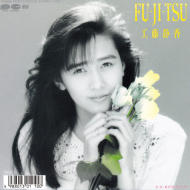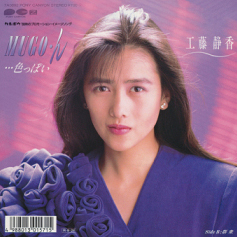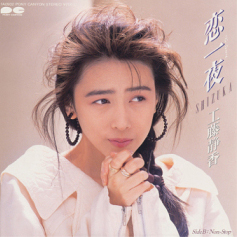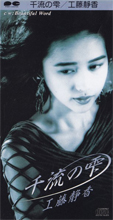
Midnight Zoo is the 37th studio album by Japanese singer-songwriter Miyuki Nakajima, released in October 2010.

"Kōsa ni Fukarete" is a song recorded by Japanese singer Shizuka Kudo, released as a single through Pony Canyon on September 6, 1989. It is Kudo's last single to be released in 7-inch vinyl format. The song, which has never appeared on an original album, was included in the compilation album, Harvest. It was featured on commercials for Taiyo Yuden That's cassette tapes.

"Fu-ji-tsu" is a song recorded by Japanese singer Shizuka Kudo for her eponymous second studio album, Shizuka. It was released on June 1, 1988 through Pony Canyon as the album's leading single. The song was written by Miyuki Nakajima and composed and produced by Tsugutoshi Gotō. This collaboration with a respected singer-songwriter like Nakajima, as well as Kudo's overall shift in image, were seen as a catalyst for the end of the 1980s idol phenomenon, with Kudo's career path being regarded as the blueprint for the successful transition from idol to artist.

"Mugon... Iroppoi" is a song recorded by Japanese singer Shizuka Kudo. It was released as a single by Pony Canyon on August 24, 1988. It was used in the Kanebo Cosmetics televised ad campaign of fall 1988, for which the catchphrase was "n... Iroppoi". Kudo made her first appearance on the 39th Kōhaku Uta Gassen and performed "Mugon... Iroppoi" for the Red team. The song was nominated for the Grand Prix at the 30th Japan Record Awards.

"Koi Hitoyo" is a song recorded by Japanese singer Shizuka Kudo, released on December 28, 1988, by Pony Canyon as the lead single from her third studio album Joy (1989). Almost a year later to the day, Kudo marked her second appearance on Kōhaku Uta Gassen by performing "Koi Hitoyo".

"Arashi no Sugao" is a song recorded by Japanese singer Shizuka Kudo, released as a single by Pony Canyon on May 3, 1989. Although the song is one of Kudo's most recognizable hits, as well as widely considered to be her breakout hit, and despite the fact that it was included on the compilation album Harvest, released later that same year, it was never featured on any of Kudo's studio albums. At the fourth Japan Gold Disc Awards, "Arashi no Sugao" was one of the five recipients of the award for Best Single of the Year. In 2015, DAM asked their users to select their favorite Shizuka Kudo songs to sing karaoke to and compiled a top ten list; "Arashi no Sugao" was ranked number seven.

"Kuchibiru Kara Biyaku" is a song recorded by Japanese singer Shizuka Kudo for her fifth studio album, Rosette. It was released by Pony Canyon as the album's lead single on January 10, 1990. Although it was not officially released on vinyl, a few copies were produced for promotional use. Kudo performed the song on the 41st Kōhaku Uta Gassen, marking her third appearance on the program. In 2015, DAM asked their users to select their favorite Shizuka Kudo songs to sing karaoke to and compiled a top ten list; "Kuchibiru Kara Biyaku" came in at number six.

"Senryū no Shizuku" is a song recorded by Japanese singer Shizuka Kudo. It was released as a single through Pony Canyon on May 9, 1990. It marks the debut of Kudo as a songwriter. The song was featured on commercials for Taiyo Yuden That's cassette tapes. Similarly to her previous single, "Kuchibiru Kara Biyaku", a limited number of 7-inch vinyls of the single were produced for promotional use. "Senryū no Shizuku" has never appeared on an original album, but was included in the compilation album Unlimited (1990).

"Watashi ni Tsuite" is a song recorded by Japanese singer Shizuka Kudo. It was released as a single by Pony Canyon on September 21, 1990. The song made its first album appearance on the compilation album Unlimited, released that same year.
"Metamorphose" is a song recorded by Japanese singer Shizuka Kudo. It is the theme song for the CX television series Nandara Mandara, which starred Kudo herself. It was released as a single through Pony Canyon on October 23, 1991. "Metamorphose" made its first album appearance on the compilation album, Intimate. Kudo performed the song on her fourth appearance on Kōhaku Uta Gassen. In 2015, DAM asked their users to select their favorite Shizuka Kudo songs to sing karaoke to and compiled a top ten list; "Metamorphose" was one of the top vote-getters, rounding up the list at number ten.
"Dōkoku" is a song recorded by Japanese singer Shizuka Kudo for her eighth studio album, Rise Me. It was released by Pony Canyon as the album's lead single on February 3, 1993. "Dōkoku" is the theme song of the CX getsuku television series Ano Hi ni Kaeritai, starring Momoko Kikuchi and Kudo herself as two sisters who fall in love with the same man. Kudo performed the song on the 44th Kōhaku Uta Gassen, marking her sixth consecutive appearance on the annual show. With over a million copies sold, "Dōkoku" remains Kudo's best-selling single to date. In 2015, DAM asked their users to select their favorite Shizuka Kudo songs to sing karaoke to and compiled a top ten list; "Dōkoku" came in at number two.

"Ice Rain" is a song recorded by Japanese singer Shizuka Kudo for her tenth studio album, Purple. It was released through Pony Canyon as the album's lead single on November 18, 1994, merely two months following the release of her ninth studio album, Expose. The single was released simultaneously with Kudo's third video album, Female III. An English version of the song was recorded for the compilation album, Best of Ballade: Current (1998). In 2015, DAM asked their users to select their favorite Shizuka Kudo songs to sing karaoke to and compiled a top ten list; "Ice Rain" came in at number three and was the only song penned by Kudo to make the top ten.

"Gekijō" is a song recorded by Japanese singer Shizuka Kudo, from her twelfth studio album, Dress. It was released by Pony Canyon as the album's lead single on November 7, 1996. It is the theme song of the CX television series Yuzurenai Yoru, starring Kudo herself. "Gekijō" was written by Miyuki Nakajima specifically for the drama; after reading the script, Kudo immediately thought of Nakajima for the soundtrack and sought to have her write the theme song. Nakajima's lyrics invoke the series' title, which loosely translates to "Unyielding Night".

"Setsu Getsu Ka" is a song recorded by Japanese singer Shizuka Kudo. It was released as a single by Pony Canyon on February 18, 1998. The song served as one of the theme songs to the tanpatsu dramas aired in 1998 on CX's Kinyō Entertainment time slot. "Setsu Getsu Ka" made its first album appearance on the compilation album, Best of Ballade: Current.

"Kirara" is a song recorded by Japanese singer Shizuka Kudo. It was released as a single by Pony Canyon on July 17, 1998. Both "Kirara" and its coupling song, "In the Sky", were prominently featured on the CX television series, Kamisama, Mō Sukoshi Dake. Kudo performed the song on the 49th Kōhaku Uta Gassen, accompanied by Taro Hakase on the violin, marking her eighth and last appearance on the show. "Kirara" made its first album appearance on the compilation album, Best of Ballade: Current, for which Kudo also recorded an English version of "In the Sky".

"Clāvis (Kagi)" is a song recorded by Japanese singer Shizuka Kudo. It was released as a single by Pony Canyon on September 6, 2006. It served as the theme song to the tanpatsu dramas aired from July through September 2006 on AX's Drama Complex time slot.
"Yukigasa" is a song recorded by Japanese singer Shizuka Kudo. It was released as a double A-side single alongside "Night Wing" by Pony Canyon on November 5, 2008.
Japanese singer Shizuka Kudo has released eighteen studio albums, fourteen compilation albums, one EP, two cover albums, six video albums, twelve live video albums, two box sets, and forty-three singles. Her career began in 1985 when she debuted as one of the three vocalists of the girl group Seventeen Club. The short-lived group disbanded after two unsuccessful singles. In 1986, she joined the idol girl group Onyanko Club as member number 38, which led to Kudo forming the subgroup Ushirogami Hikaretai the following year. She released her first solo single, "Kindan no Telepathy", on the same day as the last broadcast of the variety show Yūyake Nyan Nyan, from which the Onyanko Club members originated. It debuted at number one on the Oricon Singles Chart and became the first of eleven total number-one singles released in the late 1980s and early 1990s, including "Koi Hitoyo", "Arashi no Sugao", "Kuchibiru Kara Biyaku", "Senryū no Shizuku" and "Please". Miyuki Nakajima penned the following singles released by Kudo during this era: "Fu-ji-tsu", "Mugon... Iroppoi", "Kōsa ni Fukarete", "Watashi ni Tsuite" and Dōkoku". All five singles debuted at number one and, with total sales exceeding a million, "Dōkoku" became the best-selling single of Kudo's career.

My Treasure Best: Miyuki Nakajima × Tsugutoshi Gotō Collection is the thirteenth compilation album by Japanese singer Shizuka Kudo. It was released on February 18, 2015, through Pony Canyon. It was released as a high-resolution digital download one week in advance, on February 11, 2015, on the music store Mora.

My Precious: Shizuka Sings Songs of Miyuki is the second cover album by Japanese singer Shizuka Kudo. It was released on August 20, 2008, through Pony Canyon. The album features eleven covers of songs originally penned and performed by Miyuki Nakajima, chosen by Kudo from Nakajima's exhaustive catalog. The record also includes, as bonus tracks, three songs of Kudo's that were written and composed by Nakajima: "Gekijō" (1996), "Setsu Getsu Ka" (1998) and "Clāvis (Kagi)" (2006).
















